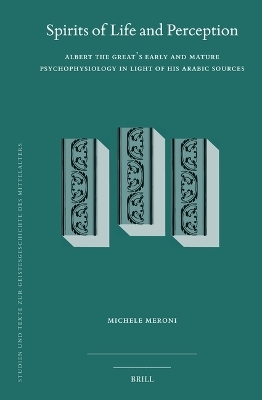
Spirits of Life and Perception
Brill (Verlag)
978-90-04-70473-2 (ISBN)
- Noch nicht erschienen (ca. November 2024)
- Versandkostenfrei innerhalb Deutschlands
- Auch auf Rechnung
- Verfügbarkeit in der Filiale vor Ort prüfen
- Artikel merken
Does a plant shrink at night and swell in the day, like an animal breathing in and out? For a long time, the Galenic concept of spiritus provided a causal explanation for human and animal life and perception. Albert the Great (1200-1280), whose honorific acknowledges among other things his pioneering work on biology, extended the concept to plants. This is only one of the remarkable concepts studied in this book, the first comparative study of Albert's concept of spiritus. It unveils the Arabic roots of his early psychophysiology and the original developments found in his mature Aristotelian paraphrases.
Michele Meroni, Ph.D. (2021), University of Milano-LMU München, is Post-Doctoral Fellow at the University of Pavia. He currently works on late medieval theories of animal cognition and has recently published on Albert the Great’s use of medical doctrines (Quaestio, 2023).
Acknowledgements
Abbreviations
Introduction
1 A Matter of Principles: The Epistemic Status of Medicine in Albert’s Early Theology and Aristotelian Paraphrases
1 What Is Health and What Is Healing? A Conundrum in Medieval Discussions
2 Healing the Soul, Healing the Body: Medicine and Natural Philosophy in Albert’s Early Theology
3 Avicenna: Between the First Teacher and the Physician
4 The De homine and the First Entry of Avicenna’s De animalibus
5 Medicine in the Aristotelian Paraphrases: Theoretical Underpinnings and Historical Context
6 Medicine in the Parva naturalia: An Open Question
7 Medicine as a Part of Natural Philosophy (?) in Albert’s Zoology
Conclusions
Part 1 Spirits of Life
2 Vita abstrahitur a vegetatione: Spirit and Albert’s Emanative Psychology of Life
1 Medieval Conceptions of Spirit: between Language of Life and Doctrine of Intermediaries
2 Keeping It Cool: Aristotle on Soul, pneuma and Life
3 Vital Spirits, Vital Faculty and Life: Costa Ben Luca, Nemesius and the Galenic Medical Tradition
4 Neoplatonic Psychology Meets Galenic Medicine: Avicenna on Spirit, Soul and Life
5 Actus animae secundum se: Soul, Spirit, and Life in Albert the Great
Conclusions
3 Spirit, Generation and Natural Teleology—Part1: Human Generation
1 “The pneuma and the Nature within It”: Aristotle on Generation
2 First Teaching vs. Anatomical Practice: Avicenna on Generation
3 Averroes on Heart, Spirit and Generation: an Undervalued Albertinian Source
4 Albert on Generation between Theology, Zoology and Botany
Conclusions
4 Spirit, Generation and Natural Teleology—Part2: Animal, Plant, and Spontaneous Generation
1 Pneuma, Animal Generation, and Spontaneous Generation in Aristotle
2 Avicenna on Spirit, Animal Generation, and (Human?) Spontaneous Generation
3 Averroes on Spirit and Spontaneous Generation
4 Animal, Plant, and Spontaneous Generation in Albert the Great
Conclusions
5 Spirit, Radical Moisture, and Longevity in Living Beings
1 Vital Heat, Moisture, and Longevity in Aristotle
2 The Lamp Metaphor, Spirit, and Radical Moisture in Avicenna
3 Spirit, Radical Moisture, and Longevity in Albert the Great
Conclusions
Part 2 Spirits of Perception
6 Spirit and potentiae apprehensivae deforis: The Psychophysiology of Sense Perception and Common Sense
1 Heat, pneuma and Sensation in Aristotle
2 Animal Spirits and Sense Perception in Costa Ben Luca and Other Medico-philosophical Sources
3 Animal Spirits in Avicenna’s Theory of Sense Perception and Common Sense
4 Spiritus animalis and potentiae apprehensivae deforis in Albert’s Psychology
Conclusions
7 Animal Spirits and Internally Apprehensive Powers (potentiae apprehensivae deintus)—Part1: Estimation and Memory
1 Aristotle on Human and Animal Cognition: Imagination, Memory, and Recollection
2 Brain Ventricles and Cognitive Faculties in Costa Ben Luca, Nemesius and Other Sources
3 Avicenna’s Psychophysiology of Inner Senses: Estimation, Memory, and Recollection
4 Averroes’ Critique of Avicennian Estimation: A Turning Point in Medieval Psychology
5 Animal Spirits and potentiae apprehensivae deintus in Albert the Great: Estimation and Memory
Conclusions
8 Animal Spirits and Internally Apprehensive Powers (potentiae apprehensivae deintus)—Part2: Sleep, Dreams and Prophecy
1 Aristotle’s Psychophysiology of Dreaming and Sleeping
2 The Psychophysiology of Sleep, Dreaming and Prophecy in Avicenna and the Arabic Philosophical Tradition
3 God-Given Dreams, Dreaming and Sleep in Albert the Great
Conclusions
Final Remarks
1 Methodology: Albert the Great and the Role of Medicine
2 The Role of Spirits
Bibliography
Index
| Erscheinungsdatum | 28.08.2024 |
|---|---|
| Reihe/Serie | Studien und Texte zur Geistesgeschichte des Mittelalters ; 136 |
| Verlagsort | Leiden |
| Sprache | englisch |
| Maße | 155 x 235 mm |
| Gewicht | 1 g |
| Themenwelt | Geschichte ► Allgemeine Geschichte ► Mittelalter |
| Geisteswissenschaften ► Geschichte ► Regional- / Ländergeschichte | |
| Geisteswissenschaften ► Philosophie ► Östliche Philosophie | |
| Geisteswissenschaften ► Philosophie ► Philosophie des Mittelalters | |
| ISBN-10 | 90-04-70473-6 / 9004704736 |
| ISBN-13 | 978-90-04-70473-2 / 9789004704732 |
| Zustand | Neuware |
| Haben Sie eine Frage zum Produkt? |
aus dem Bereich


